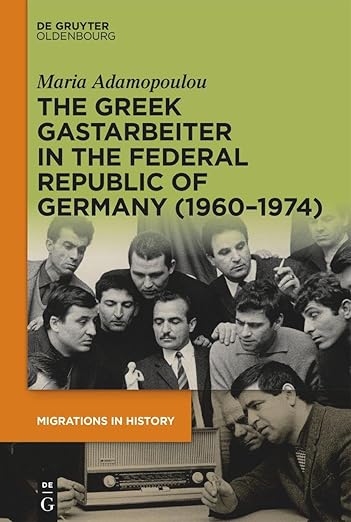


Reviewer Thordis Kokot - Universität Münster
CitationFrankfurt, Berlin, Dortmund – Many cities are currently planning to erect monuments dedicated to the Gastarbeiter ('guest workers') who came to the Federal Republic of Germany between 1955 and 1973. Despite the continuing polarization of German society over migration politics, these 'first migrants' are now, more than 60 years after their arrival, getting finally recognized in the public sphere, at least at a local level. Discussions about these monuments, as well as about the Gastarbeiter in general, are dominated by questions about integration and Germany’s transformation into an Einwanderungsland (immigration country). Maria Adamopoulous' innovative study, however, takes a different perspective on labor migration: By focussing on Greece as a country of origin, she highlights the transnational political contexts of labor migration, which have often been neglected in research.
In the monograph, which is based on her dissertation thesis, Adamopoulou argues that «[t]he life of the Greek Gastarbeiter in West Germany was far from independent of their homeland’s political situation» (p. 2). Her central thesis is that the Cold War had a fundamental impact on labor migration, firstly through the rapprochement with West Germany after the Second World War, secondly through the consequences of the Greek Civil War and the pronounced anti-communism, especially during the rule of the military junta, and thirdly through the enlargement of the European Economic Community. In order to examine the political dimensions of Greek labor migration, Adamopoulou draws on archival material, primarily from the Archive of the Ministry of Foreign Affairs in Athens, as well as contemporary publications and print media, especially newspapers from the (centre-)left political spectrum. According to the title, the study covers the time between 1960 and 1974, but the theses and chapters include a broader time frame.
Adamopoulous' 130-page study consists of six main chapters covering the period from the Nazi occupation of Greece to the end of the military dictatorship in 1974, supplemented by two chapters entitled «Intermezzo». The first chapter deals with the case of Max Merten, who was arrested in Greece in 1957 for his role in the deportation of the Jewish population of Thessaloniki. The author then describes how attitudes towards West Germany shifted as a result of the Civil War of 1946-49: In the wake of the Cold War, in the 1950s West Germany was no longer perceived as an enemy and aggressor, but came to be regarded as a highly valued political and economic partner of Greece. However, the left-wing press sometimes evoked associations with the Nazi era regarding the living conditions of the Gastarbeiter.
Chapter Two focuses on the Greek Civil War, during and after which the Greek population was «hungry for bread» and «hungry for freedom», according to the subheadings. Using statistical data, Adamopoulou demonstrates the destructive effects of the Civil War, especially in the northern regions of Greece, from which most of the 'guest workers' later came. The subsequent «Intermezzo» provides a brief summary of political party and government developments in Greece from 1945 to 1967, while the third chapter outlines the positions of the various political forces on the actual migration movements.
The fourth chapter examines the Greek state's efforts to politically control labor migration. Using the actions of Greek consul Alexis Kyrou as an example, the author shows that from the authorities' point of view labor migration was also a matter of «national security» (p. 126). Following on from this, the fifth chapter analyses the public reactions within German society to the military coup of 21 April 1967. By mentioning the actions of trade unions, West German political parties, Greek self-organisations and Greek-language radio broadcasts, this chapter argues that the Federal Republic of Germany was an important centre of resistance against the military dictatorship. After that, the following «Intermezzo» analyses how the Greek state politically exploited cultural elements such as folk music and how the military government organised summer camps for the children of guest workers.
In the sixth chapter, Adamopoulou finishes her analysis with an 'open end', in order to lead up «to a next book the new realities that the recruitment halt [Anwerbestopp] and return migration imposed» (p. 128). However, she already suggests that the recession of 1966/67 triggered a process of remigration that has intensified since 1974. In the end, the historian concludes that the guest worker system worked as planned in the Greek case, since Greece economically benefited from it, which is at this point not yet substantiated with sufficient evidence and barely refers to the preceding politics-focused analyses.
Overall, Adamopoulou intends to tell a 'different story' of the Gastarbeiter and she definitely succeeded, even though some aspects and events could have been analysed in greater depth rather than merely listing them. In addition, greater use of archival sources could have been beneficial to enhance the arguments. From the reader's point of view, it might have also been helpful to specify the title a little more. When reading this relatively compact book, one should not expect a comprehensive history of The Greek Gastarbeiter in the Federal Republic of Germany, as the generally formulated title suggests. For instance, the everyday lives and perspectives of the migrants themselves are touched upon marginally.
However, the reader can expect a concise and convincing analysis of how Greek politics and the Greek media influenced and labeled migration. Adamopoulos' work is a valuable and important addition to the existing research on labor migration, not only because it focuses on Greece, a country of origin that has received little attention so far. The methodological approach of examining labor migration from the perspective of the sending country, while emphasising the political backgrounds, highlights the many dimensions of the Gastarbeit and places this topic in a broader context of European contemporary history. In this way, the book contributes to a more nuanced and transnational view of the history of labor migration to the Federal Republic of Germany.